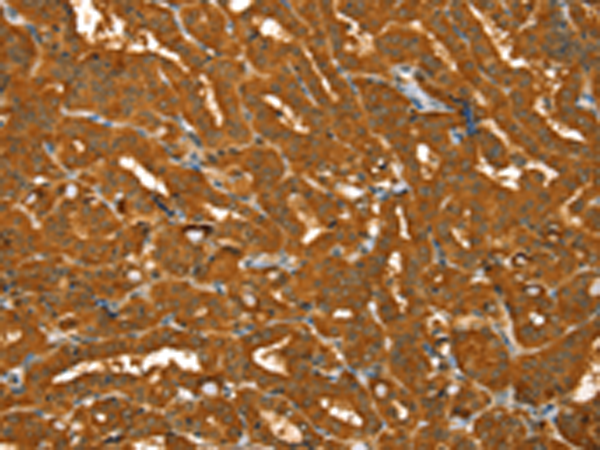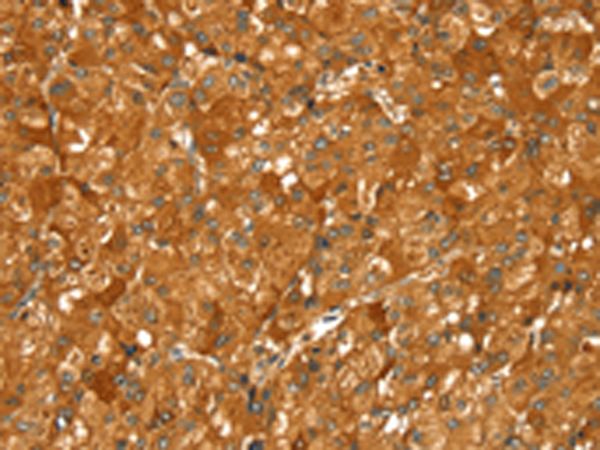


| WB | 1/500-1/2000 | Human,Mouse,Rat |
| IF | 咨询技术 | Human,Mouse,Rat |
| IHC | 1/30-1/150 | Human,Mouse,Rat |
| ICC | 技术咨询 | Human,Mouse,Rat |
| FCM | 咨询技术 | Human,Mouse,Rat |
| Elisa | 1/2000-1/5000 | Human,Mouse,Rat |
| WB Predicted band size | 97 kDa |
| Host/Isotype | Rabbit IgG |
| Antibody Type | Primary antibody |
| Storage | Store at 4°C short term. Aliquot and store at -20°C long term. Avoid freeze/thaw cycles. |
| Species Reactivity | Human, Mouse, Rat |
| Immunogen | Fusion protein of human PYGM |
| Formulation | Purified antibody in PBS with 0.05% sodium azide and 50% glycerol. |
+ +
以下是关于PYGM抗体的3篇参考文献的简要信息(注:以下内容为示例,实际文献需根据具体数据库检索验证):
---
1. **标题**: "Immunohistochemical analysis of muscle glycogen phosphorylase in McArdle’s disease"
**作者**: Martinuzzi A, et al.
**摘要**: 研究采用PYGM特异性抗体对McArdle病患者肌肉组织进行免疫组化分析,发现患者肌肉中糖原磷酸化酶活性显著缺失,为诊断提供了可靠的病理学依据。
---
2. **标题**: "Development of a monoclonal antibody-based ELISA for detecting PYGM deficiency"
**作者**: Nogales-Gadea G, et al.
**摘要**: 报道了一种基于PYGM单克隆抗体的ELISA检测方法,用于快速筛查McArdle病,验证了该方法在患者血浆样本中的高敏感性和特异性。
---
3. **标题**: "Muscle glycogen phosphorylase autoantibodies in idiopathic inflammatory myopathies"
**作者**: Pestronk A, et al.
**摘要**: 探讨了PYGM自身抗体在特发性炎性肌病中的潜在作用,发现部分患者血清中存在抗PYGM抗体,提示其可能与肌肉炎症和代谢异常相关。
---
如需具体文献,建议通过PubMed或Google Scholar以关键词“PYGM antibody”、“glycogen phosphorylase McArdle”检索最新研究。
PYGM antibody targets the muscle isoform of glycogen phosphorylase (PYGM), a key enzyme in glycogenolysis. PYGM, encoded by the *PYGM* gene on chromosome 11q13. catalyzes the breakdown of glycogen into glucose-1-phosphate in skeletal muscle, providing energy during intense physical activity. Mutations in *PYGM* are linked to McArdle disease (glycogen storage disease type V), a rare autosomal recessive disorder characterized by exercise intolerance, muscle cramps, and myoglobinuria due to impaired glycogen metabolism.
PYGM antibodies are essential tools in research and diagnostics. They enable the detection and quantification of PYGM protein expression in muscle tissues via techniques like Western blotting, immunohistochemistry, and immunofluorescence. These antibodies aid in studying PYGM’s role in energy metabolism, muscle function, and disease mechanisms. Commercially available PYGM antibodies are typically raised in rabbits or mice, produced as monoclonal or polyclonal forms, and validated for specificity against human or model organism samples.
Clinically, PYGM antibodies assist in confirming McArdle disease diagnoses by identifying reduced or absent PYGM protein in muscle biopsies. Research applications also extend to exploring metabolic disorders, exercise physiology, and therapeutic strategies targeting glycogen storage diseases. Understanding PYGM regulation and dysfunction through antibody-based assays contributes to advancing treatments for muscle-related metabolic conditions.
×